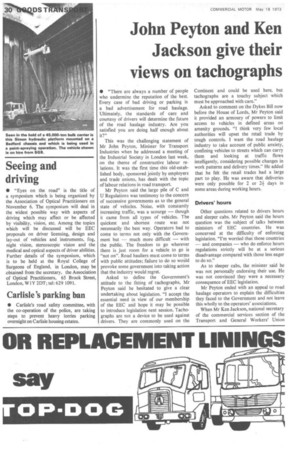John Peyton and Ken Jackson give their views on tachographs
Page 32

If you've noticed an error in this article please click here to report it so we can fix it.
• "There are always a number of people who undermine the reputation of the best. Every case of bad driving or parking is a bad advertisement for road haulage. Ultimately, the standards of care and courtesy of drivers will determine the future of the road haulage industry. Are you satisfied you are doing half enough about it?"
This was the challenging statement of Mr John Peyton, Minister for Transport Industries when he addressed a meeting of the Industrial Society in London last week, on the theme of constructive labour relations. It was the first time this old-established body, sponsored jointly by employers and trade unions, has dealt with the topic of labour relations in road transport.
Mr Peyton said the large pile of C and U Regulations was testimony to the concern of successive governments as to the general state of vehicles. Noise, with constantly increasing traffic, was a scourge — though it came from all types of vehicles. The quickest and shortest route was not necessarily the best way. Operators had to come to terms not only with the Government but — much more difficult — with the public. The freedom to go wherever there is just room for a vehicle to go is "not on". Road hauliers must come to terms with public attitudes; failure to do so would provoke some government into taking action that the industry would regret.
Asked to define the Government's attitude to the fitting of tachographs, Mr Peyton said he hesitated to give a clear undertaking about legislation. "I accept the essential need in view of our membership of the EEC and hope it may be possible to introduce legislation next session. Tachographs are not a device to be used against drivers. They are commonly used on the Continent and could be used here, but tachographs are a touchy subject which must be approached with care."
Asked to comment on the Dykes Bill now before the House of Lords, Mr Peyton said it provided an armoury of powers to limit access to vehicles in defined areas on amenity grounds. "I think very few local authorities will upset the retail trade by tough controls. I want the road haulage industry to take account of public anxiety, confining vehicles to streets which can carry them and looking at traffic flows intelligently, considering possible changes in work patterns and delivery times." He added that he felt the retail trades had a large part to play. He was aware that deliveries were only possible for 2 or 2+ days in some areas during working hours.
Drivers' hours
Other questions related to drivers hours and sleeper cabs. Mr Peyton said the hours question was the subject of talks between ministers of EEC countries. He was concerned at the difficulty of enforcing legislation. "I'm worried that those countries — and companies — who do enforce hours regulations strictly will be at a serious disadvantage compared with those less eager to do so."
As to sleeper cabs, the minister said he was not personally endorsing their use. He was not convinced they were a necessary consequence of EEC legislation.
Mr Peyton ended with an appeal to road haulage operators to explain the difficulties they faced to the Government and not leave this wholly to the operators' associations.
When Mr Ken Jackson, national secretary of the commercial services section of the Transport and General Workers' Union
















































































































